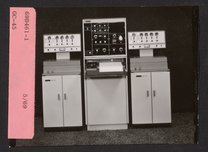Oral history interview with Harold M. McNair
- 2011-Nov-06 – 2011-Nov-07
Harold M. McNair grew up in Miami, Arizona, one of two sons. His parents worked in the local copper mines; they were not highly educated, but they valued education and encouraged Harold. He did well in school but also loved sports, playing tennis especially well. He won a tennis scholarship, Elks Club award, and a Phelps Dodge Scholarship to the University of Arizona where he majored in chemistry and minored in physics. He found his professors very challenging and interested in their students. McNair won more honors, including being a Rhodes Scholar alternate. McNair entered Purdue University's PhD program and continued to work in industry during the summers. Fascinated by instrumentation, he met A. J. P. Martin at Amoco and cemented his interest in gas chromatography (GC). At a GC meeting J. J. Van Deemter encouraged him to build Purdue's first gas chromatograph. McNair's next stop was Eindhoven, the Netherlands, for a Fulbright Scholarship, working with A. I. M. Keulemans. In addition to learning a great deal he met his future wife. He returned to the United States to a job at Esso, studying rocket fuels for the US Department of Defense. In addition to his regular duties McNair wrote Basic Gas Chromatography. After a year he left Esso for F&M Scientific, and they moved back to Amsterdam. There they had three successful years before McNair went to Varian, Inc., to be director of European operations. The next four years were spent in California, with frequent travel to Europe, now with three children. McNair was recruited by two of his former Purdue professors to take a professorship at Virginia Polytechnic Institute and State University (Virginia Tech). While continuing his regular teaching and research, he expanded the short course program he had begun at Varian. The quality of life and science at Virginia Tech persuaded him to remain there rather than return to industry as he had originally planned. With some of his students McNair established COLACRO (Congress in Latin America about Chromatography), which has taught short courses and introduced GC into almost all of the countries in Latin America. Although he is retired now he continues to teach an occasional short course and to do some work on bomb residues for the FBI. He is also interested in food science and is working on a study of the relationship between cows' diets and milk. McNair remains extremely enthusiastic about separation science, especially GC, which he says is still an important tool of analysis, especially in the biomedical and health fields. He discusses the evolution of instrumentation in GC, talks about liquid chromatography, and praises both his mentors and his students. He gives his wife much credit for her help, especially with foreign students. He is proudest of his supernetwork, "McNair's Mafia," from undergraduates through colleagues. He believes that his most significant contribution is his Basic Gas Chromatography. He says that among the pioneers of GC, A. J. P. Martin, Steve Dal Nogare, and A. I. M. Keulemans were his most important mentors; they taught him chemistry but also how to live and laugh.
Access this interview
By request 1 PDF Transcript File and 5 Audio Recording Files
Fill out a brief form to receive immediate access to these files.
If you have any questions about transcripts, recordings, or usage permissions, contact the Center for Oral History at oralhistory@sciencehistory.org.









